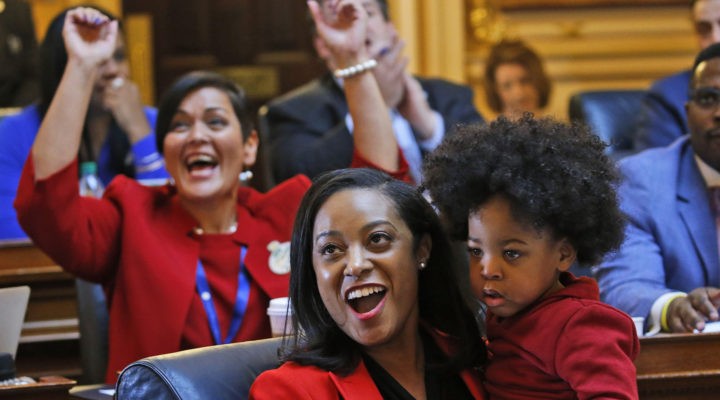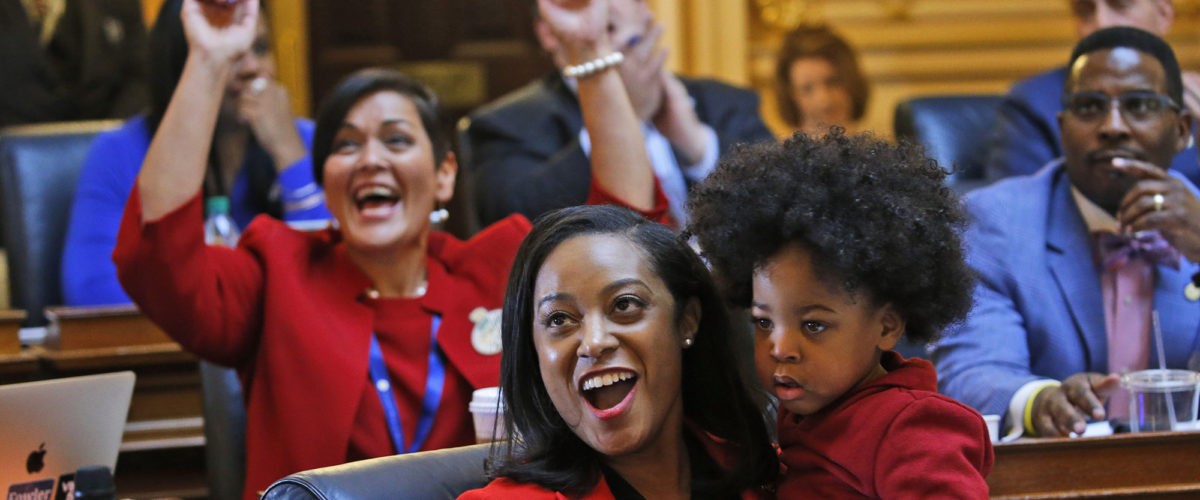Editor’s note: On Jan. 21, U.S. Representative Jackie Speier (D-Calif.) introduced a resolution in Congress to certify the Equal Rights Amendment. As of last January, the required 38 states have ratified the ERA, but the Trump administration blocked certification of the amendment.
Across the 20th century, Baptists were divided over women’s rights. In 1911, J.W. Porter, editor of the Kentucky Baptist Western Recorder, wrote, “The feminine demons, knowingly or otherwise, are pointing womankind to the path that leads to harlotry and to hell.” Other Baptists, however, supported suffrage because they thought giving women the vote would lead to moral reform.

Carrie Baker
Similarly, in the 1970s, Baptists struggled over women’s liberation. In 1971, Billy Graham wrote in a Baptist publication for young women, “Wife, mother, homemaker — that is the appointed destiny of real womanhood.” Many Baptist publications, however, openly supported equality. The next year, Home Missions magazine decided to use “Ms.” instead of “Miss” or “Mrs.” The editors wrote, “Because the women in this issue command respect, and have such dignity and worth in their own right — without reliance on the condition of their ring-finger — we chose to recognize them by accepting the feminists’ abbreviation, ‘Ms.’”
Originally drafted by suffragist Alice Paul, the ERA was first introduced in Congress in 1923. The bill was introduced in every session of Congress in different forms until it finally passed in 1972. The Amendment is short and simple:
Section 1. Equality of Rights under the law shall not be denied or abridged by the United States or any state on account of sex.
Section 2. The Congress shall have the power to enforce, by appropriate legislation, the provisions of this article.
Section 3. This amendment shall take effect two years after the date of ratification.
Opponents of the ERA put a seven-year timeline for ratification in the preamble to the amendment. States began ratifying right away, but the amendment did not reach the required 38 states by 1972, so Congress passed a three-year extension of the timeline. But only 35 of the needed 38 states had ratified the amendment by the 1982 timeline.

Susan Shaw
Recently, pro-ERA activists have advocated what they call a “three-state strategy” — seeking three more states to ratify the amendment and then a congressional joint resolution to remove the timeline. The strategy was inspired by the ratification of the 27th Amendment (relating to salaries for members of Congress), which Congress originally approved in 1789. After Michigan became the 38th state to ratify the 27th Amendment in 1992, Congress passed a joint resolution agreeing that the amendment was validly ratified.
In 2017, Nevada became the 36th state to ratify the ERA, followed by Illinois in 2018 and Virginia in 2020. The final step was for the national archivist to certify the amendment, which the Trump administration blocked.
But now, with the Biden-Harris administration and Democratic control of both chambers of Congress, the amendment is likely to be certified. Biden’s “Agenda for Women” supports the Equal Rights Amendment, and Harris has spoken in favor of the ERA. “Passing the ERA, let’s start there,” Harris told an audience in Iowa during a campaign event in 2019, when asked what she would do for women in the first 100 days if elected president.
On Jan. 21, Congresswoman Jackie Speier introduced a bill in the U.S. House of Representatives with bipartisan support of 195 co-sponsors to remove the arbitrary timeline for ratification. The next day, Sens. Ben Cardin (D-Md.) and Lisa Murkowski (R-Alaska) introduced an identical bill in the Senate. Congress has this power to modify ratification timelines, say constitutional law scholars Erwin Chemerinsky, dean of the UC Berkeley School of Law, and Kathleen Sullivan, former dean of Stanford Law School.
Given the progress women have experienced in the nearly half century since the amendment passed Congress, you might wonder why we still need an ERA.
“Polling shows massive public support for the ERA.”
Polling shows massive public support for the ERA. The vast majority of respondents — men and women; Republicans, Democrats and independents —want the ERA, and most think the ERA already is part of the Constitution. Nearly two-thirds believe the ERA would have a positive impact for women. And indeed, it would.
While there is a patchwork of constitutional and statutory provisions to prohibit some forms of sex discrimination in some circumstances, many of these provisions have been undermined, overturned and even repealed. And all are subject to interpretation by the U.S. Supreme Court.
The Supreme Court has interpreted the 14th Amendment’s Equal Protection Clause to provide limited equality protections against sex discrimination — but even these limited protections could easily be overturned by the Supreme Court. In fact, conservatives on the court have long disputed that the Equal Protection Clause provides any protections for women. In 2011, former Justice Antonin Scalia said in an interview that the Equal Protection Clause should not apply to women because it was never intended to do so in 1868 when it was adopted.
“The Supreme Court has interpreted the 14th Amendment’s Equal Protection Clause to provide limited equality protections against sex discrimination.”
“You do not need the Constitution to reflect the wishes of the current society,” he claimed. “The only issue is whether it prohibits (sex discrimination). It doesn’t. Nobody ever thought that that’s what it meant. Nobody ever voted for that. If the current society wants to outlaw discrimination by sex, hey, we have things called legislatures, and they enact things called laws.”
The current conservative 6-3 super-majority on the court could easily follow Scalia’s reasoning. All six conservative Supreme Court justices are current or former members of the Federalist Society (as was Scalia), which advocates “originalism,” or looking to the intent of the Constitution’s authors for its meaning. And we know that the men who wrote the Constitution intentionally excluded women from its protections — despite Abigail Adams’ pleas to her husband, John, just months before he drafted the Declaration of Independence, to please “remember the ladies.”
The United States is the only major democracy in the world with a written Constitution that does not have an equal rights amendment. And without an explicit declaration of equality in the Constitution, women’s rights always are at risk.
The Equal Rights Amendment would not only guarantee equality in the Constitution, but it would give Congress the power to address many deeply rooted societal problems like pay inequity and violence against women.
“In 2000, the Supreme Court invalidated an important provision of the Violence Against Women Act.”
In 2000, the Supreme Court invalidated an important provision of the Violence Against Women Act that allowed survivors of gendered violence to sue their attackers for damages; it ruled that Congress had no constitutional authority to enact the provision. The ERA would give Congress that authority.
The ERA also would protect against LGBTQ discrimination because of last June’s Supreme Court decision in Bostock v. Clayton County that the word “sex” includes sexual orientation and gender identity. President Biden reaffirmed this principle in a Jan. 20 executive order.
This moment gives us an opportunity to enshrine equality for women in the Constitution, and Christians should support this amendment. From Jesus’ treatment of women to Paul’s declaration that in Christ there is neither male nor female and recognition of the work of women as apostles, deacons and co-laborers, the Bible makes clear that all humans are of equal worth and deserving of equal dignity and treatment.
Churches that do still practice exclusion of women and LGBTQ people from leadership need not fear that they will be forced to change their hiring processes. The First Amendment adequately provides for protections for religious beliefs and practices.
In 1920, Georgia’s Christian Index called the 19th Amendment a “great event in the world for women to be given full voice in the government of the United States of America.” In 2021, we should support the Equal Rights Amendment to give full equality at last to women in the United States of America.
Carrie N. Baker, J.D., Ph.D., is a professor in the Program for the Study of Women and Gender at Smith College and contributing editor of Ms. magazine. Susan M. Shaw is professor of women, gender and sexuality studies at Oregon State University in Corvallis, Ore. She also is an ordained Baptist minister and holds master’s and doctoral degrees from Southern Baptist Theological Seminary. Her most recent book is Intersectional Theology: An Introductory Guide, co-authored with Grace Ji-Sun Kim.


